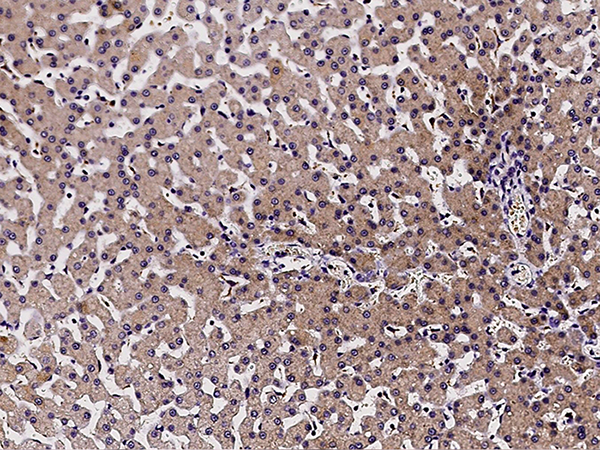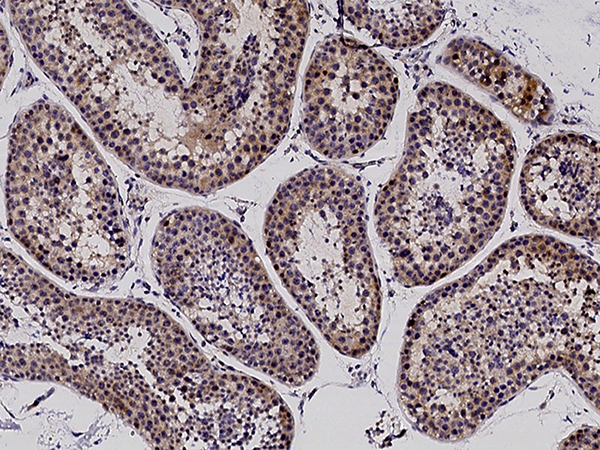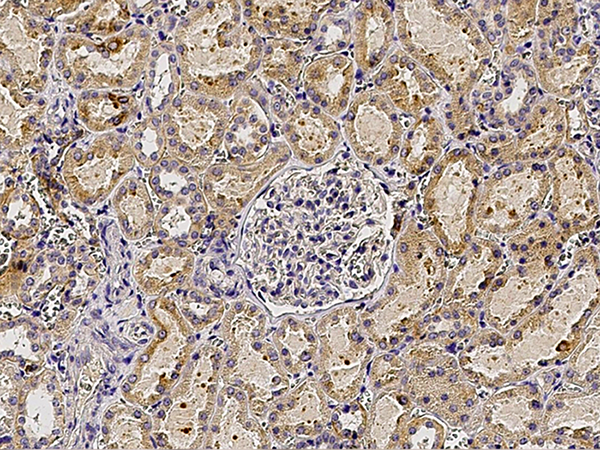-
Product Name
Anti-TRAIL R4/CD264/TNFRSF10D antibody
- Documents
-
Description
Rabbit polyclonal to TRAIL R4/CD264/TNFRSF10D
-
Tested applications
ELISA, IHC-P
-
Species reactivity
Cynomolgus TRAIL R4 / CD264 / TNFRSF10D
-
Alternative names
CD264 antibody; DCR2 antibody; TRAIL R4 antibody; TRAIL R4 antibody; TRAILR4 antibody; TRUNDD antibody; CD264 antibody; TRUNDD antibody; TRAILR4 antibody; TRAIL-R4 antibody; DCR2 antibody
- Immunogen
-
Isotype
Rabbit IgG
-
Preparation
Produced in rabbits immunized with purified, recombinant Cynomolgus TRAIL R4 / CD264 / TNFRSF10D (rh TRAIL R4 / CD264 / TNFRSF10D; F6TP11; Met1-Leu206). TRAIL R4 / CD264 / TNFRSF10D specific IgG was purified by Cynomolgus TRAIL R4 / CD264 / TNFRSF10D affinity chromatography.
-
Clonality
Polyclonal
-
Formulation
0.2 μm filtered solution in PBS
-
Storage instructions
This antibody can be stored at 2℃-8℃ for one month without detectable loss of activity. Antibody products are stable for twelve months from date of receipt when stored at -20℃ to -80℃. Preservative-Free.
Sodium azide is recommended to avoid contamination (final concentration 0.05%-0.1%). It is toxic to cells and should be disposed of properly. Avoid repeated freeze-thaw cycles. -
Applications
ELISA:0.1-0.2 μg/mL
This antibody can be used at 0.1-0.2 μg/mL with the appropriate secondary reagents to detect Cynomolgus TRAIL R4 / CD264 / TNFRSF10D. The detection limit for Cynomolgus TRAIL R4 / CD264 / TNFRSF10D is < 0.039 ng/well.
IHC-P: 0.1-2 μg/ml
-
Validations

TRAIL R4 / CD264 / TNFRSF10D Antibody, Rabbit PAb, Antigen Affinity Purified, Immunohistochemistry

TRAIL R4 / CD264 / TNFRSF10D Antibody, Rabbit PAb, Antigen Affinity Purified, Immunohistochemistry

TRAIL R4 / CD264 / TNFRSF10D Antibody, Rabbit PAb, Antigen Affinity Purified, Immunohistochemistry
-
Background
Tumor necrosis factor receptor superfamily member 10D (TNFRSF10D), also known as TNF-related apoptosis-inducing ligand receptor 4 (TRAIL R4), CD264, and Decoy receptor 2, is a member of the TNF-receptor superfamily. This receptor contains an extracellular TRAIL-binding domain, a transmembrane domain, and a truncated cytoplamic death domain. This receptor does not induce apoptosis, and has been shown to play an inhibitory role in TRAIL-induced cell apoptosis. TRAIL R4/CD264/TNFRSF10D is widely expressed, in particular in fetal kidney, lung and liver, and in adult testis and liver. TRAIL R4/CD264/TNFRSF10D is also expressed in peripheral blood leukocytes, colon and small intestine, ovary, prostate, thymus, spleen, pancreas, kidney, lung, placenta and heart. The signaling capacity of TRAIL R4 is similar to that of TRAIL R1 and TRAIL R2 with respect to NF-κB activation, but differs in its inability to induce apoptosis. TRAIL R4 retains a C-terminal element containing one third of a consensus death domain motif. Transient overexpression of TRAIL R4 in cells normally sensitive to TRAIL-mediated killing confers complete protection, suggesting that one function of TRAIL R4 may be inhibition of TRAIL cytotoxicity.
-
References
- Degli-Esposti MA, et al. (1997) The novel receptor TRAIL-R4 induces NF-kappaB and protects against TRAIL-mediated apoptosis, yet retains an incomplete death domain. Immunity. 7(6): 813-20.
- Meng RD, et al. (2000) The TRAIL decoy receptor TRUNDD (DcR2, TRAIL-R4) is induced by adenovirus-p53 overexpression and can delay TRAIL-, p53-, and KILLER/DR5-dependent colon cancer apoptosis. Mol Ther. 1(2): 130-44.
- Bouralexis S, et al. (2003) Progressive resistance of BTK-143 osteosarcoma cells to Apo2L/TRAIL-induced apoptosis is mediated by acquisition of DcR2/TRAIL-R4 expression: resensitisation with chemotherapy. Br J Cancer. 89(1): 206-14.
Related Products / Services
Please note: All products are "FOR RESEARCH USE ONLY AND ARE NOT INTENDED FOR DIAGNOSTIC OR THERAPEUTIC USE"
